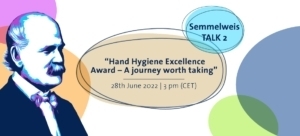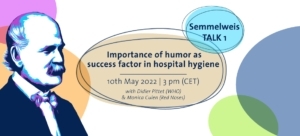Patient safety should be at the core of doctors’ work. Hans Härting, who has been working in the aviation industry for more than thirty years, educates healthcare workers about the detail-oriented procedures in his field. He is convinced that they could equally benefit from one another.
Hans Härting, Captain at Austrian Airlines, is responsible for the Human Factors Department of Air Operations and manager at AssekuRisk. AssekuRisk is a company, which tries to implement the security and safety systems of aviation into hospital systems, e.g. medical staff has to complete a check list before visiting a patient. Härting also spends a significant amount of time in hospitals and healthcare institutions to educate doctors and healthcare workers about hygiene compliance. When one asks about his motivation on the matter, his answer is straight-forward: “Medical errors are the third leading cause of death, and I am convinced that healthcare workers can learn a lot from aviation.”
Is a hygiene co-pilot the answer?
Aviation offers invaluable lessons healthcare organizations can draw from, Härting is convinced. In the course of recent years, the airline industry has considerably improved their safety measures and streamlined them. In fact, passenger mortality significantly decreased. It seems that aviation does the right thing. Healthcare needs to be active in finding solutions for patients’ safety.
A very useful intervention was the introduction of a hygiene co-pilot – a responsible person (either a doctor or a nurse) present during patient visits ensuring that hand disinfection is carried out after each patient contact. This person serves as a “human reminder” to disinfect one’s hands after each contact.
Additionally, Härting underlines that medicine lacks something prevalent in aviation: there are standardized procedures with regard to safety. He adds that interpersonal skills are extremely important to adhere to compliance, e.g. how you share information and how you cooperate.
Zero tolerance in hand hygiene
150 years ago, a doctor lay the foundation for the decrease of infections in hospitals in Vienna. In the late 1840s, the famous gynaecologist Ignaz Semmelweis was confronted with a high infection and mortality rate of mothers in hospitals. When he instructed his students to disinfect hands and instruments with chlorinated lime solution after sections, the mortality rate fell abruptly from 98.4 deaths out of 1,000 births to 12.7 deaths. His ultimate goal was to bring the infection rate to zero.
Healthcare activists keep fighting for “zero tolerance” in hospitals up to this day. Honorary President of the Semmelweis Foundation, Prof. Didier Pittet, contributes with his WHO initiative “Clean Care is Safer Care” to improve patient safety in hospitals worldwide.




